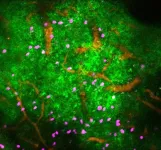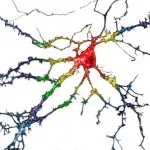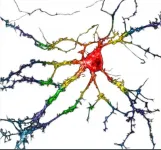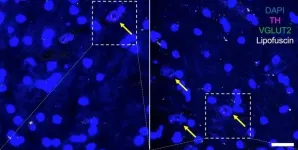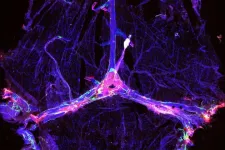(Press-News.org) UNIVERSITY PARK, Pa. -- There are hard-to-please customers in almost every industry, with certain people being picky about which clothes, houses and even romantic partners they will consider.
A new series of studies has found that shopper pickiness can go beyond shopping for the "best" option. The researchers define what it means to be "picky" and also developed a scale for measuring shopper pickiness.
Margaret Meloy, department chair and professor of marketing at Penn State, said the findings could help companies devise the best strategies for satisfying their pickier customers.
"If a company knows they have a lot of picky customers, they may need to change the way they reward salespeople or dedicate specific salespeople to their pickiest customers, because picky shoppers have very narrow preferences and they see perceived flaws in products others wouldn't notice," Meloy said. "Alternatively, a company may allow picky shoppers to customize their products to satisfy their idiosyncratic preferences. It's not just about offering the best products, but offering the products that are best for the picky customers."
Meloy added that even the most robust promotional strategies, like offering a free gift with purchase, may fail with picky customers.
Previous research has found that about 40% of people have family or friends they would consider "picky," suggesting the trait is common. The researchers said it might be helpful for retailers to have a better understanding of what being "picky" means for their customer base, and what those customers may need from a product or shopping experience.
Meloy said that while pickiness affects a customer's shopping habits and therefore affects a company's business, there hasn't been much research done on defining pickiness or investigating how it influences a customer's behavior.
"In marketing, we call customers who want the absolute best version of a product 'maximizers,'" Meloy said. "But with picky customers, the best is more idiosyncratic. For them, it might not be about getting the best quality, but getting the precise version of a product they have in their head -- a shirt in a very precise shade of black, for example. We wanted to explore this a bit more."
For the paper -- recently published in the Journal of Consumer Psychology -- the researchers performed a series of studies to create a scale for measuring shopper pickiness and to identify the consequences of that pickiness on customer behavior.
The first series of studies focused on developing the scale. The researchers said they created a series of questions that would help uncover the psychological dimensions of pickiness while also avoiding using the word "picky," since the word tends to have negative connotations. Once the researchers were confident the scale accurately measured pickiness, they conducted additional studies to examine the possible consequences of pickiness.
The researchers found that people who scored higher on the picky shopper scale tend to have a small window of what they consider acceptable, which the researchers described as having a small latitude of acceptance and a wide latitude for rejection. These shoppers were more likely to reject a free gift when offered as a thank you for participating in a survey.
"This may seem irrational to some people who may not understand why a person would reject things that come at no cost," said Andong Cheng, an assistant professor of marketing at the University of Delaware who earned her doctorate at Penn State. "We speculate that it could be psychologically costly for picky shoppers to take free items that they don't like because possessing these items is a source of irritation for these individuals."
Additionally, the researchers found that picky people didn't change their opinions based on a product's popularity. When they were informed that their top choice of a product was less popular than other options, people who scored high on the picky scale weren't swayed by that information. They stuck with their original selection.
Meloy said the results support the theory that being picky is a general personality trait that isn't just present in one situation or area of a person's life.
"We looked at a range of contexts to see whether being picky in one domain meant you were likely to be picky in others," Meloy said. "Sure enough, individuals who were picky in one domain were picky in other domains. For example, if you tend to be picky while shopping for groceries, you'll probably be picky shopping for clothes, as well."
Meloy said the findings also illustrate the importance of a company understanding and tailoring their business practices to their customer base.
"If you know you have a lot of picky customers, you might not want to bother with offering free products or promoting products by saying how popular they are with other people," Meloy said. "It's just not going to work as well with picky customers. These companies will need to come up with strategies that give customers more control to better align their idiosyncratic preferences with the company's offerings."
Hans Baumgartner, Smeal Chair Professor of Marketing at Penn State, also participated in this work.
INFORMATION:
In collaboration with VGP, the research group has published a research paper in Nature on platypus and echidna genomes early this year (see report in the right column). In the Nature current special issue, the research group published another study on the genome of the common marmoset, an important primate model for neurodegenerative diseases, drug development and other biomedical research.
The genome includes two sets of chromosomes, one inherited from the mother, the other from the father. In traditional genome sequencing efforts including the human genome project, the sequencing only produced a mosaic reference ...
While evolution is normally thought of as occurring over millions of years, researchers at the University of California, Irvine have discovered that bacteria can evolve in response to climate change in 18 months. In a study published in the Proceedings of the National Academy of Sciences, biologists from UCI found that evolution is one way that soil microbes might deal with global warming.
Soil microbiomes - the collection of bacteria and other microbes in soil - are a critical engine of the global carbon cycle; microbes decompose the dead plant material to recycle nutrients back into the ecosystem and release carbon back into the atmosphere. Multiple environmental factors influence the composition and functioning of soil microbiomes, ...
The neurotransmitter noradrenaline, which plays a key role in the fight-or-flight stress response, impairs immune responses by inhibiting the movements of various white blood cells in different tissues, researchers report April 28th in the journal Immunity. The fast and transient effect occurred in mice with infections and cancer, but for now, it's unclear whether the findings generalize to humans with various health conditions.
"We found that stress can cause immune cells to stop moving and prevents immune cells from protecting against disease," says senior study author University of Melbourne's Scott Mueller (@SMuellerLab) of the Peter Doherty Institute for Infection and Immunity (Doherty Institute). "This is novel because it was not known that ...
Psychedelic drugs have shown promise for treating neuropsychiatric disorders such as depression and posttraumatic stress disorder. However, due to their hallucinatory side effects, some researchers are trying to identify drugs that could offer the benefits of psychedelics without causing hallucinations. In the journal Cell on April 28, researchers report they have identified one such drug through the development of a genetically encoded fluorescent sensor--called psychLight--that can screen for hallucinogenic potential by indicating when a compound activates the serotonin 2A receptor.
"Serotonin reuptake inhibitors have long been used for treating depression, but we don't ...
A genetically encoded sensor to detect hallucinogenic compounds has been developed by researchers at the University of California, Davis. Named psychLight, the sensor could be used in discovering new treatments for mental illness, in neuroscience research and to detect drugs of abuse. The work is published April 28 in the journal Cell.
Compounds related to psychedelic drugs such as LSD and dimethyltryptamine (DMT) show great promise for treating disorders such as depression, post-traumatic stress disorder, and substance use disorder. These drugs are called psychoplastogens ...
It's one of the most audacious projects in biology today - reading the entire genome of every bird, mammal, lizard, fish, and all other creatures with backbones.
And now comes the first major payoff from the Vertebrate Genome Project (VGP): near complete, high-quality genomes of 25 species, Howard Hughes Medical Institute (HHMI) Investigator Erich Jarvis with scores of coauthors report April 28, 2021, in the journal Nature. These species include the greater horseshoe bat, the Canada lynx, the platypus, and the kākāp? parrot - one of the first high-quality ...
Researchers have big ideas for the potential of quantum technology, from unhackable networks to earthquake sensors. But all these things depend on a major technological feat: being able to build and control systems of quantum particles, which are among the smallest objects in the universe.
That goal is now a step closer with the publication of a new method by University of Chicago scientists. Published April 28 in Nature, the paper shows how to bring multiple molecules at once into a single quantum state--one of the most important goals in quantum physics.
"People have been trying to do this for decades, so we're very excited," said senior author Cheng Chin, a professor of physics at UChicago who said he has wanted ...
PITTSBURGH, April 28, 2021 - It is not every day that scientists come across a phenomenon so fundamental that it is observed across fruit flies, rodents and humans.
In a paper published today in Aging Cell, neuroscientists from the University of Pittsburgh Schools of the Health Sciences discovered that a single protein--a glutamate transporter on the membrane of vesicles that carry dopamine in neurons--is key to regulating sex differences in the brain's vulnerability to age-related neuron loss.
The protein--named VGLUT--was more abundant in dopamine neurons of female fruit flies, rodents and human beings than in males, correlating with females' greater resilience to age-related neuron loss and mobility deficiencies, the researchers found. Excitingly, ...
DURHAM, N.C. -- A multidecade study of young adults living in the United Kingdom has found higher rates of mental illness symptoms among those exposed to higher levels of traffic-related air pollutants, particularly nitrogen oxides, during childhood and adolescence.
Previous studies have identified a link between air pollution and the risk of specific mental disorders, including depression and anxiety, but this study looked at changes in mental health that span all forms of disorder and psychological distress associated with exposure to traffic-related air pollutants.
The findings, which will appear April ...
Experimental Alzheimer's drugs have shown little success in slowing declines in memory and thinking, leaving scientists searching for explanations. But new research in mice has shown that some investigational Alzheimer's therapies are more effective when paired with a treatment geared toward improving drainage of fluid -- and debris -- from the brain, according to a study led by researchers at Washington University School of Medicine in St. Louis.
The findings, published April 28 in the journal Nature, suggest that the brain's drainage system -- known as the meningeal lymphatics -- plays a pivotal but underappreciated role in neurodegenerative disease, and that repairing faulty drains could be a key to unlocking the potential of certain Alzheimer's therapies.
"The ...
